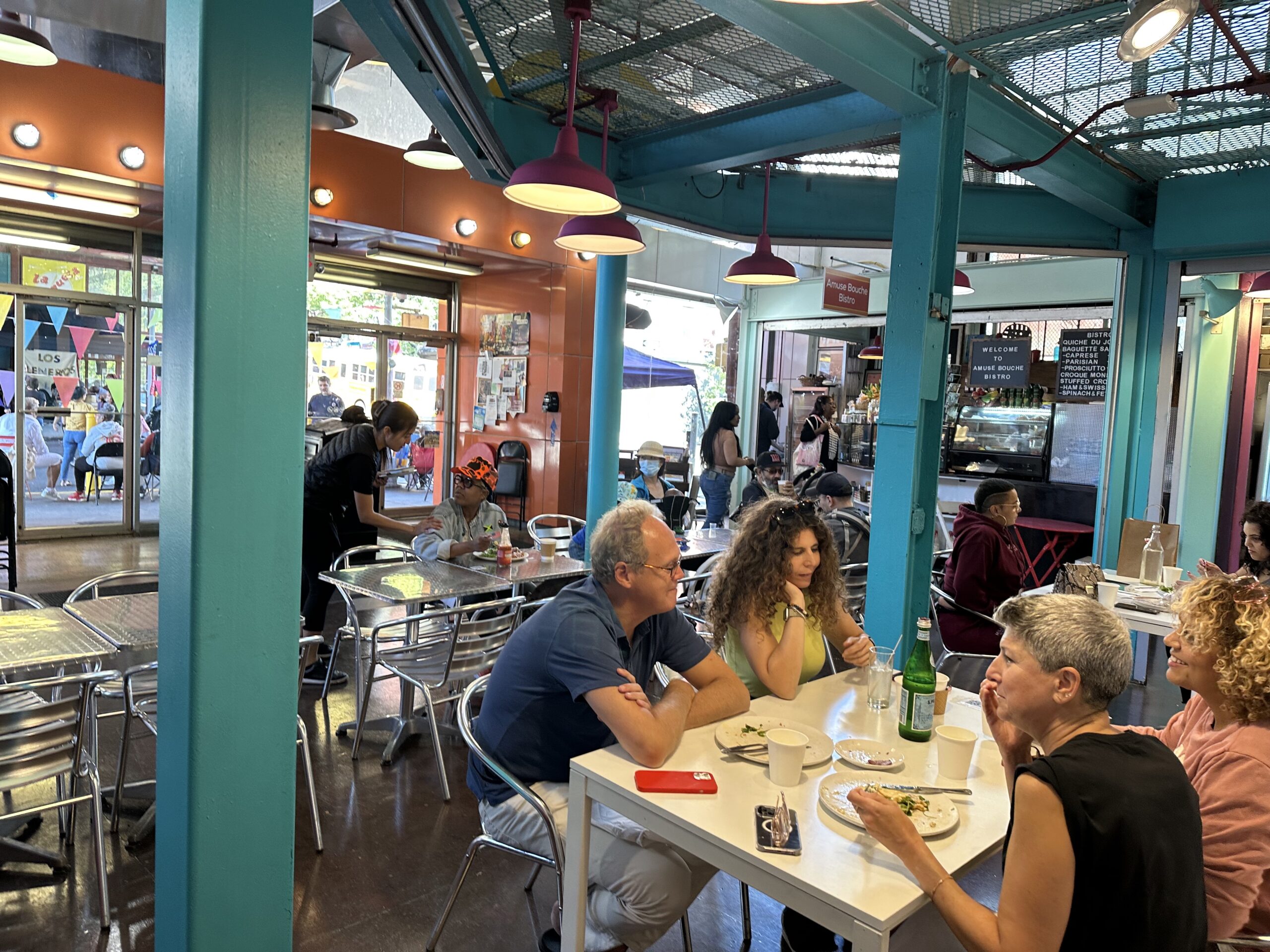Editor’s note: This story, originally published on Columbia News Service, has been republished by City Limits through a Creative Commons agreement.
When customers walked inside La Marqueta’s doors on Park Avenue & 116th Street, their senses were immediately flooded with the smell of fish. Hundreds of vendors were greeted by their customers and neighbors with requests for fresh food. “Mira, José, dame …” Octopus, conch shells, bacalao, or further back in the market, beef, pork chops, salami and spices. You name it, La Marqueta had it. For several blocks long.
At least this is how Peggy Morales, a long time East Harlem resident and former District Leader, remembers Saturday morning shopping trips with her grandmother when she was a child.
“It’s almost as if that entire colony of people from Puerto Rico had come [to East Harlem] and was placed in La Marqueta and now everyone knew everyone’s name,” Morales said.
Today, La Marqueta has only four food vendors. And although the market used to run from 116th down to 111th Street beneath the Park Avenue viaduct, now it retains just one lot, on Park Avenue between 114th and 115th Street.

La Marqueta during Party on Park, an open streets event from 111th to 125th Streets. (Credit: Karla Marie Sanford)
La Marqueta is managed and sponsored by the New York City Economic Development Corporation (EDC), a non-profit corporation that manages numerous city-owned properties. In 2017, EDC conceptualized a plan to revitalize the original footprint of La Marqueta after the New York City Council allocated $25 million to improvements at the market. But six years later, vendors say they have seen little of the money. The delay is due to the ongoing construction of the Park Avenue Viaduct, according to several EDC and local representatives. But for the vendors at La Marqueta, the lack of transparency around the project’s timeline represents a larger issue of EDC being out of touch with running a small business.
“We were promised a lot of things, like other vendors being in here, a full kitchen through the EDC, but nothing’s really come through,” said Frances Roman, Owner of Cocotazo, a Puerto Rican restaurant that just celebrated its one-year anniversary at La Marqueta.
Roman said that vendors are being forced to share a kitchen one lot over. EDC owns that lot, she said, but the company that rents it, e.terra Kitchen, is a for-profit venture. Roman said that means vendors have to pay hourly rents of between $27 to $40 an hour, with a four-hour booking minimum.
Anthony Mariano, co-owner of Amuse Bouche Bistro, another food vendor in La Marqueta, explained that vendors must use e.terra’s kitchen even though there is an unused commercial kitchen, which used to belong to the non-profit Hot Bread Kitchen, on the market’s premises.
“We have petitioned EDC, our local elected leaders, community board members, asking that this kitchen should be dedicated to vendors within the market since we have no cooking space,” said Mariano. “Literally, the kitchen has been sitting empty for years.”
Mariano and Romano both run catering businesses to offset their costs at La Marqueta. The vendors say these compounded costs are probably why EDC has struggled to fill the vacant stalls, despite La Marqueta’s below-market rent.
David Hughes, the vice president and executive director of markets for the EDC, said it’s more complicated than that.
“We’re trying to build traffic and build customer base, but if you don’t have the businesses inside, the customers won’t come, and the businesses won’t come if there’s no customers,” he said.
Part of EDC’s strategy for attracting customers to the market has been to hold more community events, such as free educational and nutritional programming, said Hughes. Yet several local residents say that many community members aren’t even aware that La Marqueta has re-opened since the COVID-19 shut-down in 2020.
Morales said La Marqueta needs to offer amenities for a more diverse and younger crowd, such as a reading nook, or an arts and crafts space. “Then children can come three times a week or on Saturday morning and be part of a workshop,” she added.
Other residents say the market out-prices the neighborhood.
“This is still a low-income community,” said Yesenia Lebron-Romero, the programs director at Los Pleneros de la 21, an East Harlem organization dedicated to sharing Puerto Rican Bomba and Plena music. “It’s hard for people in the community to pay for a $18 brunch for one person.”
“You have to buy essentials, you have to buy food,” agreed Wanda Rosario, an artisan who sews aprons and masks to sell at the artist collective La Bodega in La Marqueta. “Your pockets are empty even though you appreciate the art.”
Hughes said the $25 million allocated to La Marqueta from the city in 2017 is effectively “on hold” as EDC waits to learn more about the Metropolitan Transportation Authority’s scheduled work. The MTA will be responsible for restoring elements of La Marqueta that are affected by the ongoing construction, according to local representatives.
Hughes said the EDC was not aware of the extent of the construction when it first issued its concept vision plan.
“Now we know everything from 115th to 123rd is being demolished and rebuilt,” he said. This includes La Placita, a community space adjacent to the market, which re-opened in 2019 following a $5.5 million renovation.
“So, that’s the next four years, maybe three years of disruption,” he added.
Ultimately, Hughes said, he sees La Marqueta taking about 10 more years to become an attraction for the community and the rest of the city.
But for vendors who rely on La Marqueta to make a living, hope for the future is not enough.
Correction: This story has been updated to reflect that construction of the Park Avenue viaduct the root of delays, not the Second Avenue construction project.
About the author(s)
Karla Marie Sanford is a student at the Columbia Graduate School of Journalism and she currently covers community health and economic development in underserved neighborhoods.




